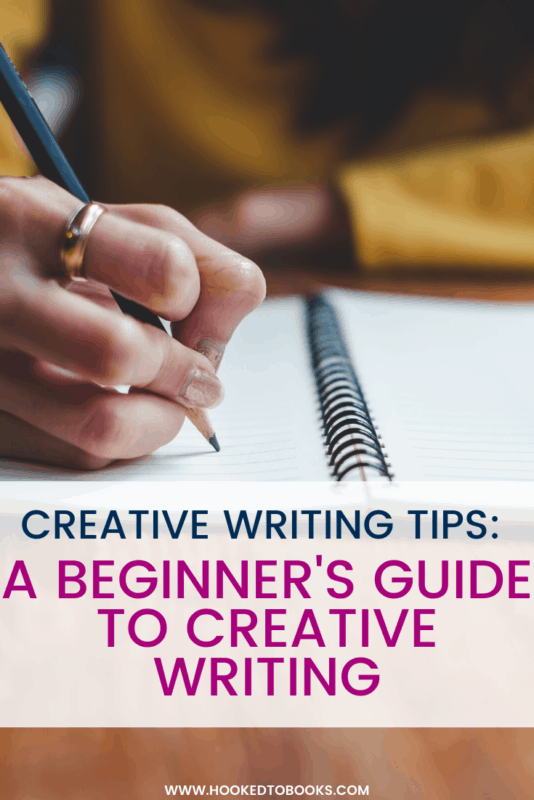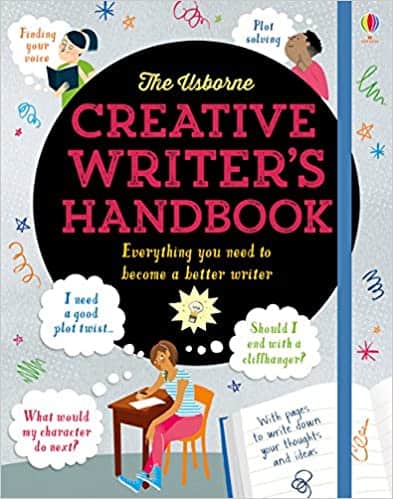Stories truly do make the world go round. I have a firm belief that storytelling is one of the most important parts of human culture.
You can’t even turn around without some method of storytelling impacting your life: whether it’s in books or the lyrics to an unforgettable song or the script of a movie or just two people sharing about that wild thing that happened to them last week. But if you want to capture a story, really keep it and hone it and make it unforgettable, you need to write it down.
So we need to talk about creative writing.
The task of learning to be an amazing creative writer can be a bit daunting, but let’s break it down. We’ll cover tips on how to improve your writing skills and polish those gems of stories you have swirling around your imagination.

What Is Creative Writing?
Creative writing is when you tell a story, usually fiction or poetry, that draws off ideas and imagination. It can anything from short stories, whole full-length novels, poetry collections, memoirs, or scrips and plays. The voice, style, and genre of creative writing can be vastly different. No two people are the same, so it makes sense that everyone’s writing is different too.
The important part of creative writing is the “creative” part. Of course, everything is rooted in what you know in the real world, including real experiences and settings and concepts, but how can you tell that in a creative and innovative way, full of rich imagination and sensory descriptions?
Creative writing means fantasy books and poetry with ethereal metaphors. Creative writing means fictional romances and children’s whimsical nursery rhymes. Creative writing means imagination.
10 Tips to Get Started In Creative Writing
1. Write What You Want to Read
It’s easy to get stuck in the thinking that your writing will only be worthwhile if it’s like some other famous writer’s or if it fits the same themes other people have made popular. But writing is hard work.
If you’re going to pour your blood, sweat, tears, and passion into this, you need to like what you’re doing. So chase stories that make your heart beat faster. Write the things that make you a little giddy inside with excitement. Write for yourself first, your audience second. It will keep your motivation alive and help you write more authentically and passionately.
2. Speaking of Which…Know Your Audience!
If you aim to be published someday, you need to know who you’re writing for. Otherwise, your work (be it a short story or a creative essay or a novel) will be hard to place on submission to publishers.
Save yourself the headache later and figure out what genre, age-range, and style your work is. This also helps to hone your voice. If your writing style is upbeat and full of quips and romantic catastrophes and laughs, you might want to write a romcom instead of a military sci-fi novel.
Genre crossovers can be utterly epic, so you don’t need to lock yourself down in rules all the time. But if you’re starting out, keep it simple! Learn the rules before you break them.
3. Writers Must Be Readers.
The best way to know your audience is to know what other books are out there. We’d be awfully suspicious if we went out to eat at a bakery only to hear the chef never a bread, ever.
So no matter what you’re writing, make sure you’re reading widely and voraciously, and challenging yourself in other genres and styles. Read outside of what you write too! It can spark all sorts of delicious ideas. Reading also keeps your own creative juices flowing.
The last thing you want to do is burn yourself out from writing every spare second and not imputing creativity into your life. Learn from the bests. Read a book.
4. Capture Your Readers’ Attention
What makes your story different? What makes your voice stand out? Why are you telling this story? Some of these questions can be hard to answer and saying “um, because I want to” is sometimes valid enough.
But in a world crammed with stories, you need to stop your reader from looking away. Write epic first sentences and fill your pages with scintillating characters for the reader to love.
Your first sentence is your hook, but every sentence after that should still be powerful and interesting. If you’re bored writing, your audience will be bored reading.
[convertkit form=942417]
5. Develop Your Style By Writing And Writing Some More.
Seriously “practice makes perfect” does actually work, as annoying as it is to be told that. If you squint sideways at the first thing you ever wrote, maybe it’s not so bad. But also chances are you want to bury it under 50ft of sand. That’s fine! But keep writing. Find your voice. Find your style.
Experiment with everything until you figure out what clicks. It’s fine to be in awe of your author heroes, but don’t try to be them.
You don’t have to be the next George RR Martin or JK Rowling to write a novel that captures the attention of the world. And if you’re not sure how to find your style? A good way is to just keep writing. Channel the styles you admire but twist it to make it your own and let it happen naturally.
6. You’re Allowed to Write Badly
First drafts are allowed to be bad! As Ernest Hemingway said, “The only kind of writing is rewriting.” You seriously can write your ambitious and glorious ideas super badly and then work on rewriting, honing, and refining them later.
Sometimes it’s easier to dump your feelings onto the page and then sort through for the gems. Know when to kill your darlings (NOT just your characters…” kill your darlings” means cut unnecessary prose and wordy sentences and scenes that don’t push the story along!). First drafts need to exist, not be perfect straight away.
7. Learn How to Edit
Because everything needs editing. Even if you write a piece that seems perfect…uh, no. It needs editing. And you do need outside help for this. A fresh perspective will point out things you didn’t consider before.
Sometimes they’re mistakes, but sometimes they’re just ways to make your work better. Try not to think of criticism as pointing out your failures. Think of it as improving what you’ve already got.
If you’ve made a chocolate cake and someone suggests putting caramel frosting on it, it doesn’t mean your chocolate cake was awful. It just means it could be even better.
8. Use The 5 Senses to Make Your Writing Stronger
This has always been my favorite writing tip! Ever read something and felt it was bland and grey? You can avoid that by leaning into the sensory description.
Describe smells and tastes, describe tactile feelings and visual stimuli. Describe the smell of walnuts and cranberries as you walk into the grandfather’s kitchen and the way the floorboards buckle by the stove and the rough texture of his homespun shirt.
These sorts of details make the scene feel real to a reader. It draws them in and paints a picture. But don’t overdo it. A few powerful details are better than two pages describing a teacup. Keep it powerful and to the point.
9. Find A Writing Group
Writing can be lonely, and there’s nothing more demotivating than losing the spark to write because you’re doing it in solitude. Find your people!
Critique groups can be great for pushing you to be a better writer, but find friends who’ll also encourage you and cheer you on. It’s not weak or selfish to need encouragement. We writers are here for the long haul, and I would be totally lost without my writing friends.
10. Don’t Quit
Writing is hard, and sometimes it feels like the more you learn, the harder it gets. But it’s a craft to conquer, a skillset to hone, and you only fail at it when you pack it up for good. So kick the self-doubt mindset (not easy to do, but you have to work at it!) and realize rejections are inevitable but not a reflection of your worth.
Some days you’ll power out incredible and inspirational sentences. Other days your brain feels like a potato and you write nothing. This is fine! Find your pace, your style, your people – and don’t quit.
Good Books to Read About Creative Writing
The more you know about a topic and the more you practice, the easier it is to take the plunge to become a master of the skillset. So if you’re looking for some books that cover creative writing in details, with perspectives from professionals who’ve achieved success, try some of these:
- Creative Writer’s Handbook by Megan Cullis
- How Writing Works: A Field Guide To Effective Writing by Roslyn Petelin
- Go Teen Writers: Edit Your Novel by Stephanie Morrill and Jill Williamson
- Bird by Bird: Some Instructions on Writing And Life by Anne Lamott
- Save The Cat! Writes A Novel: by Jessica Brody
- Zen In The Art Of Writing by Ray Bradbury
- The Emotion Thesaurus: A Writer’s Guide To Character Expression by Becca Puglisi
About the Author
CG Drews is a YA book blogger with the goal to read every book in existence. She’s aiming for immortality for this. When not reading, she writes novels and blogs at paperfury.com.










